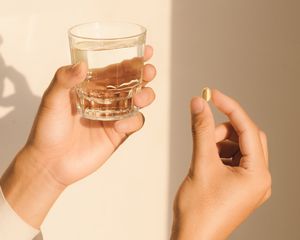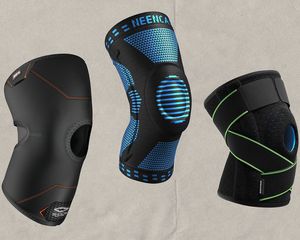:max_bytes(150000):strip_icc()/GettyImages-1484106444-6f488d72c0834a39beb868a51a1b9205.jpg)
PeopleImages / Getty
Our relationship with sweat is largely based on circumstance. A bout of nervous sweats seeping through a beloved silk dress on date night is the kind of possibility that has us waking up in cold sweats the night before. Walking away from a workout sans sweat, however, is about as unsatisfying as it gets. While our body's natural predisposition to sweating may be a little more tone-deaf than we'd prefer, the benefits of the whole ordeal are very much welcomed. Sweating is the body's internal cooling mechanism to counteract increased heat, but the overarching positive effects are thought to include weight loss, detoxification, heart health, muscle recovery, immunity, and clear, youthful skin.
Ready to embrace the sweat? We tapped the experts to further explain the benefits of this natural bodily function.
Meet the Expert
- Gudrun Snyder, D.Ac., MSAc, LAc, is a Doctor of East Asian Acupuncture who specializes in a root-cause resolution approach to treatment. She is the founder of Moon Rabbit Acupuncture.
- Dr. Josh Axe, DNM, CNS, DC, is a board-certified doctor of natural medicine, chiropractic doctor, and certified nutrition specialist. He is the founder of Ancient Nutrition and DrAxe.com, as well as the author of several books including Ancient Remedies: Secrets to Healing with Herbs, Essential Oils, CBD, and the Most Powerful Natural Medicine in History.
Here are all the ways sweating it out can be beneficial to your physical and mental well-being.
Helps With Weight Loss
First and foremost, sweating is thought to boost weight loss. Yes, you may lose water weight during a session that will inevitably come right back, but because your body is working so hard to cool you down, you're also using energy and burning calories, which contributes to more permanent weight loss.
Increases Circulation
"Sweat primarily serves the function of cooling the body. As sweat evaporates from the skin, it takes heat with it, thus regulating your body temperature," explains Snyder. "Heat causes blood vessels to dilate (widen), leading to increased blood flow to the treated area. Moreover, sweating can have a positive impact on skin and circulation. Sweating can increase blood circulation, which is important for overall cardiovascular and tissue health."
Flushes Out Toxins
While the ability of sweat to simply detoxify the body is often debated, Axe explains that the skin can remove toxic compounds from the body. "We really do flush out certain toxins through our sweat," he says.
"Sweating serves to help detox and protect the body," echoes Snyder. "Salts, urea, and heavy metals are released through sweating." In fact, a 2012 study found that sweating plays an important role in expelling heavy metals like mercury, lead, cadmium, and arsenic from the body because they dissolve readily in water. However, Axe explains that sweat can't flush out all toxic compounds, so it's important to drink filtered water and follow a healthy diet in order to avoid other low-dose chemical threats.
Boosts Heart Health
Putting the body in a situation where it needs to cool itself down by sweating can get your heart pumping similar to a cardio workout. Additionally, Axe points out that sweating, whether it be from physical exercise or from sitting in a sauna environment, can reduce the risk of cardiovascular health problems. He cites a study published in 2015 that followed Finnish men for 20 years, finding that those who sweat in a sauna more frequently were less likely to develop a fatal disease over the course of the study.
Aids Muscle Recovery
Although a sweat session won't help you build muscle, it can aid in muscle recovery. "Sweating boosts circulation and helps flush out lactic acid," according to Axe. This can alleviate soreness and speed up the recovery process. "The heat generated during sweating may also provide relief for sore muscles and joints," adds Snyder. "Improved circulation delivers more oxygen and nutrients to the muscles, which can help with muscle repair and recovery."
Reduces Pain
Before reaching for a painkiller, consider diving into a good sweat sesh instead. "Sweating also may have a natural analgesic effect, helping to alleviate minor aches and pains," notes Snyder. "For individuals with chronic pain conditions, heat therapy can alleviate discomfort and improve mood by reducing the perception of pain. Chronic pain often takes a toll on mental health, and managing pain effectively can lead to better psychological outcome."
Increases Immunity
Axe explains that the skin is considered a vital part of the immune system, which makes sense considering it's often the first line of defense against everything you come in contact with each day. "Anybody fluids are part of this biological defense system, serving as a deterrent for germs to take hold," he says.
"Sweat contains antimicrobial peptides that have the potential to fight off bacteria, viruses, and fungi," adds Snyder. Additionally, human sweat contains a natural germ-killing protein called dermcidin, which can protect against strains of germs that cause diseases like MRSA and tuberculosis.
Produces Glowing Skin
Just as sweat can flush out certain toxins, it can also expel impurities like pollutants, dirt, and makeup embedded in the skin. It's thought to improve the tone, clarity, and texture of the skin and is known to improve circulation, which can benefit the skin as well.
Lifts the Mood
"Exercise induced sweating is linked to the release of endorphins, our body’s 'happy' hormones," says Snyder. "This can lead to improved mood and reduced stress levels." This can do wonders for your overall well-being.
While you certainly don't have to venture to an urban sweat lodge on a hot summer's day to experience the benefits of sweating, you can find a practice that works for you in order to get in on the feel-good effects of this natural bodily function. Just be sure to recover from any cardio workout or sweat session with plenty of water to keep your body hydrated.
Unclogs Pores
Contrary to popular belief, sweating can actually help improve acne. How? Well, sweating helps unclog pores. "It opens the pores, which can assist in clearing out dirt and oil," explains Snyder. When you sweat, your pores open up and allow all the dirt, oil, bacteria, and debris in your pores a way out—the caveat here is that you should shower/wash your face as soon as your sweat sesh ends so that bacteria doesn't end up right back into your pores.
Lowers Risk of Kidney Stones
You might think using the bathroom less might be a cause for concern, but when it comes to kidney stones, it's actually a good thing. Sweating = less peeing, so there's less chance for kidney stone-causing minerals to sit in the kidneys and urinary tract. And when you sweat, you drink more water, which means you also flush out these minerals. Who knew?



